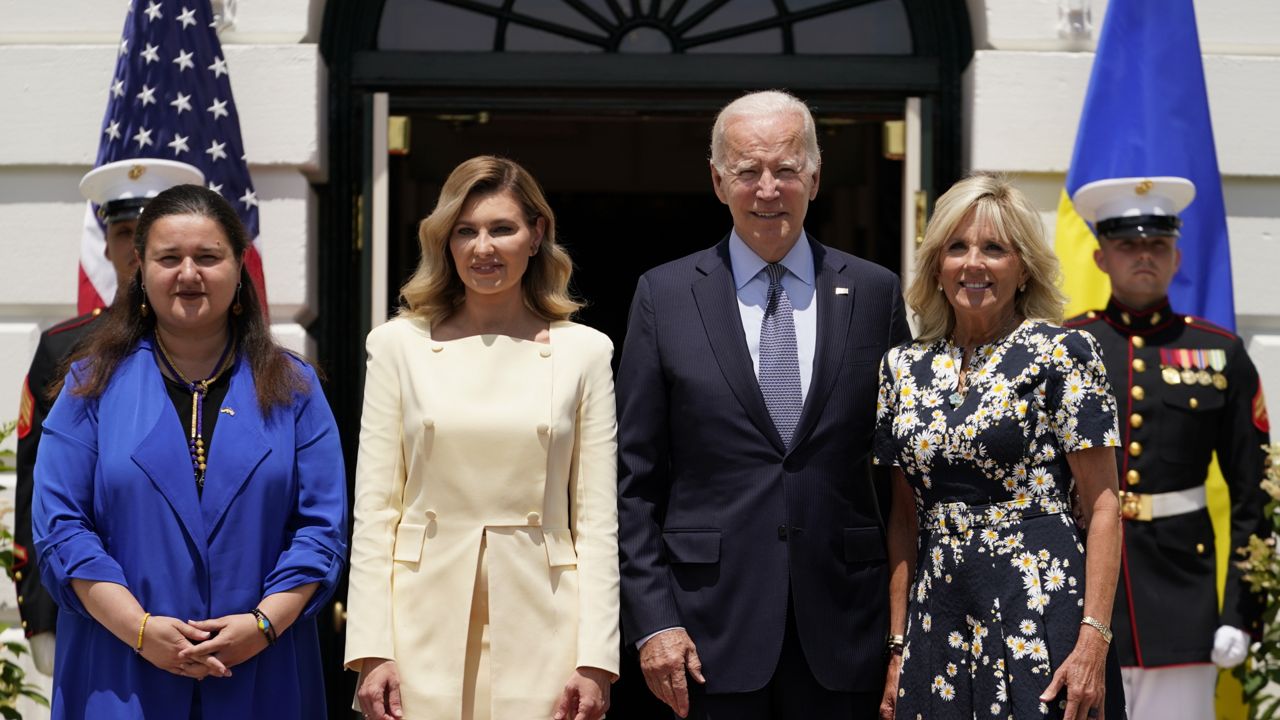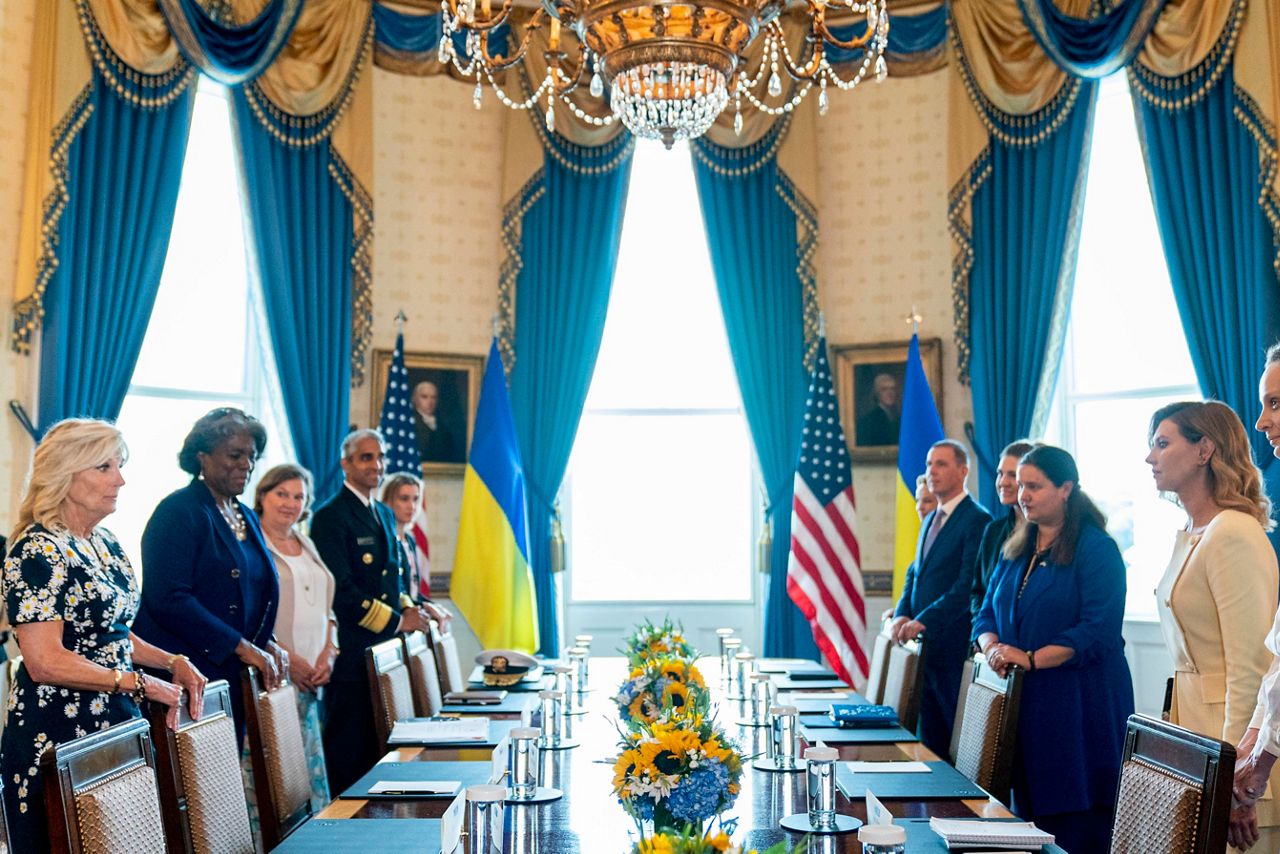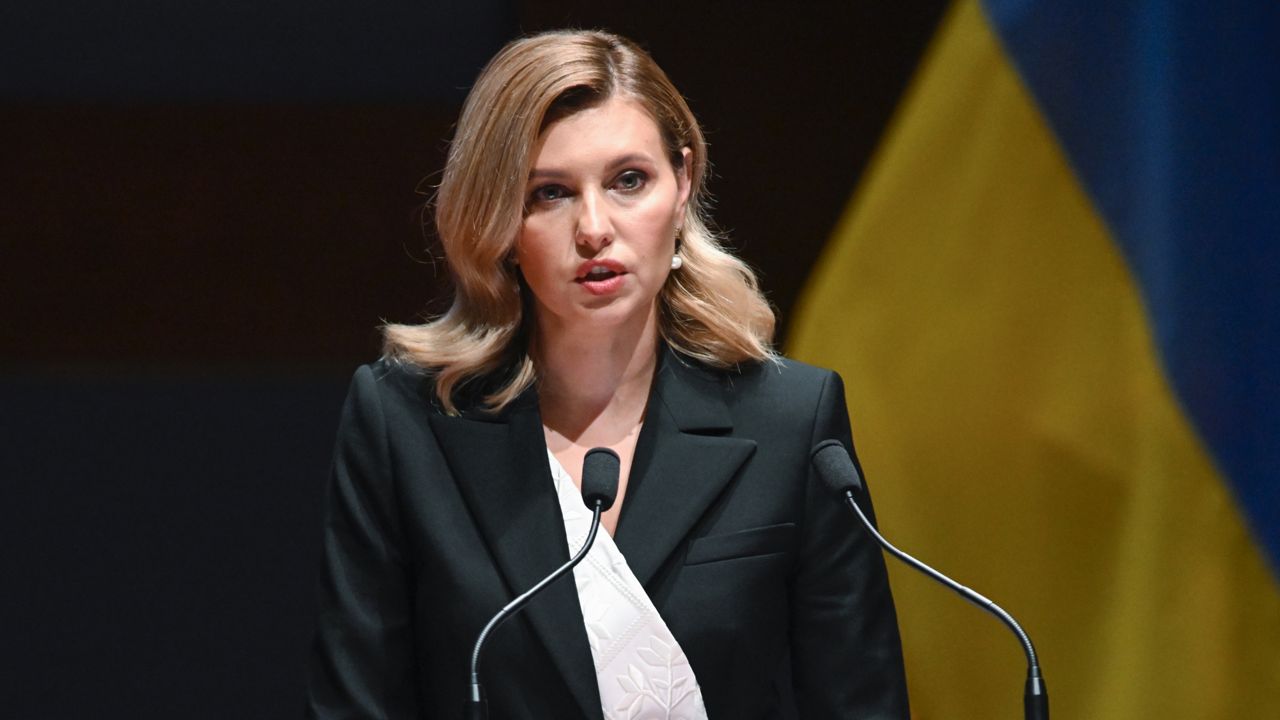Ukraine’s First Lady Olena Zelenska, wife of Ukraine’s President Volodymyr Zelenskyy, delivered an impassioned address to members of Congress on Wednesday, speaking of the human toll Russia’s invasion has wrought on her country while photos of slain and injured Ukrainians played on a screen behind her.
“Usually the wives of presidents are exclusively engaged in peaceful affairs – education, human rights, equality, accessibility. And maybe you expected from me to speak on those topics,” she told lawmakers assembled in the U.S. Capitol. “But how can I talk about them when an unprovoked, invasive terrorist war is being waged against my country?”
“Russia is destroying our people,” she added.
Zelenska went on to describe the plight of Ukraine’s children, first telling the story of a four-year-old named Lisa who she said was killed on July 14 when a Russian missile strike hit the city of Vinnytsia.
She also spoke of Sophia, a young girl whose mother was killed when Russian troops occupied Bucha. Sophia, who lost an arm amid the violence, now suffers from “phantom pains,” Zelenska said.
And she mentioned her own children, saying she and other parents all over Ukraine seek the normalcy of being able to “tell their child to go to sleep peacefully, there will be no more airstrikes, no more missile strikes.”
Zelenska and Zelenskyy share two children: Oleksandra, 18, and Kyrylo, 9.
The first lady went on to ask Congress to provide Ukrainian forces with “weapons, weapons that would not be used to wage a war on somebody else's land, but to protect one's home and the right to wake up alive in that home.”
“I'm asking for air defense systems in order for rockets not to kill children in their strollers, in order for rockets not to destroy children's rooms and kill entire families,” she added.
“America unfortunately knows from its own experience what terrorist attacks are and has always sought to defeat terrorists,” Zelenska went on to say. “Help us to stop this terror against Ukrainians. And this will be our joy: great victory in the name of life, freedom and the pursuit of happiness of every person, every family. This is what I'm asking for.”
Zelenska often evoked the word “terrorist” in her address, but the United States has yet to formally recognize Russia as a state sponsor of terrorism – though there is bipartisan support for the move in Congress.
Sen. Lindsey Graham, R-S.C., and Sen. Richard Blumemthal, D-Conn., – both of whom were present for Zelenska’s address and who could be seen conversing with the first lady after her speech – introduced legislation calling on the Department of State to recognize Russia as a state sponsor of terrorism. Currently, there are only four countries who have been given such a designation by the U.S. government: Cuba, North Korea, Iran and Syria.
Countries designated as such are subject to a number of limitations, which include “restrictions on U.S. foreign assistance; a ban on defense exports and sales; certain controls over exports of dual use items; and miscellaneous financial and other restrictions,” per the Department of State.
Zelenska's address to Congress came the day after President Joe Biden and first lady Dr. Jill Biden welcomed her to the White House. The president, a surprise guest at Tuesday’s greeting on the South Lawn, offered Zelenska a symbolic bouquet of yellow sunflowers, blue hydrangeas and white orchids – blue and yellow being the colors of Ukraine’s flag – before posing for a few photos and heading inside for a meeting.

The two first ladies were joined by several administration officials, including second gentleman Douglas Emhoff, United Nations ambassador Linda Thomas-Greenfield and surgeon general Vivek Murthy, for a bilateral meeting to discuss “how the United States can continue to alleviate suffering through support and humanitarian assistance to the Ukrainian people, and the need to hold accountable those responsible for war crimes and other atrocities,” per the White House.
Tuesday’s meeting was the second between Dr. Biden and Zelenska in the past several months, as the former traveled to Ukraine on Mother’s Day for a surprise visit to meet at a school that was temporarily being used to house migrants escaping violence in the region.
“I wanted to come on Mother’s Day,” Biden told Zelenska at the time. “I thought it was important to show the Ukrainian people that this war has to stop and this war has been brutal and that the people of the United States stand with the people of Ukraine.”
The first lady on Tuesday spoke of the profound impact her visit to Ukraine had, saying: "You cannot go into a war zone and come back and not feel the sorrow and the pain of the people that I met."
"You asked me then to talk about mental health issues," Dr. Biden continued. "And so I came back and I talked to my team and I think you received my letter about what we're doing to help with mental health for the mothers and the children who have really suffered such tragedy and atrocities. And so I've been working on it. The team has been working on it."
"Every one of our agencies that's been working on this is going to tell you specifically what they've done," she added.

Ukraine’s President Zelenskky addressed Congress soon after Russia first invaded his country, appearing virtually in front of lawmakers in mid-March to say: “I'm proud to greet you from Ukraine from our capital city of Kyiv that is under missile and airstrikes from the Russian troops every day, but it doesn't give up. And we have not even thought about it for a second.”
Zelenskyy also implored the United States and its allies to implement a no-fly zone over Ukraine, but acknowledged the U.S. has been unwilling to do so for fear of igniting an all-out war with Russia.
“We are asking for a reply for an answer to this terror from the whole world. Is this a lot to ask for to create a no-fly zone over Ukraine to save people,” he said. “Is this too much to ask? A humanitarian no-fly zone, something that Ukraine it that Russia would not be able to terrorize our free cities.”
Neither the United States nor any of its allies have heeded Zelenskyy’s request to implement a no-fly zone over Ukraine. But the Biden administration has sent nearly $7.3 billion in military assistance to the country since Russia first launched its attack.
In the months since Russia first invaded Ukraine on Feb. 24, the United Nations has recorded nearly 11,862 civilian casualties within the country, including 5,110 killed and 6,752 injured. At least 346 of the deceased are children, per the U.N., though it said the actual toll for all estimates is likely “much higher” given the nature of the conflict.
The United Nations also estimates that nearly 9.1 million individuals have fled Ukraine, the vast majority of whom crossed the borders into Moldova, Poland, Slovakia and Hungary.



